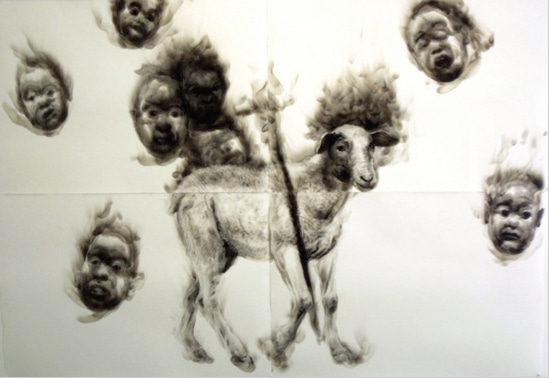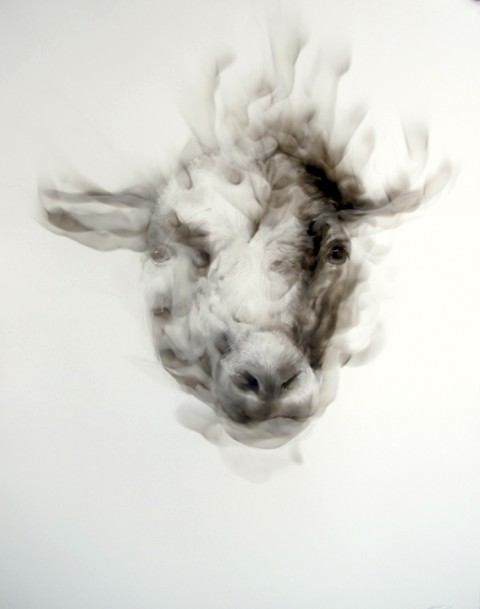January 4: The Witness
♫ Music:
Behold, the Lamb of God
John 1:29-34
The next day he saw Jesus coming toward him, and said, “Behold, the Lamb of God, who takes away the sin of the world! This is he of whom I said, ‘After me comes a man who ranks before me, because he was before me.’ I myself did not know him, but for this purpose I came baptizing with water, that he might be revealed to Israel.” And John bore witness: “I saw the Spirit descend from heaven like a dove, and it remained on him. I myself did not know him, but he who sent me to baptize with water said to me, ‘He on whom you see the Spirit descend and remain, this is he who baptizes with the Holy Spirit.’ And I have seen and have borne witness that this is the Son of God.”
John the Baptist
by Eugene H. Peterson
Raucous John skilled in epiplexis
pounds the pious ears of Pharisees,
stumps the desert to raise a righteous caucus
and clear the streets of unbelief for Jesus.
The locust/honey diet makes him lithe,
the rough leather jerkin shows him humble.
His lungs are purged of cant by desert air,
his Isaianic eyes alert to wonder.
Expert Messiah-watcher, he, not fooled
by desert sharpers greedy for miracles
and promising easy kingdoms, is faithfully
awake to give the inaugural word, “Behold!”
THE WITNESS
When ‘raucous’ John (who Eugene Peterson portrays so artfully in his poem) declared Jesus to be ‘the Lamb of God,’ he invoked a history and prophecy deep, mysterious, and ultimately glorious. Long ago Abraham trusted that, “God Himself will provide the lamb;” at the Passover the enslaved Hebrews painted their door frames with lamb’s blood; and countless lambs were sacrificed in Israel’s temple. But the prophecies foretold something greater still: the Messiah. Led like a lamb to the slaughter, He would inaugurate a new covenant in His blood and ultimately reign victorious over all. It was foretold; it was also veiled in mystery.
John the Baptist, that ascetic, desert herald, stands at the mysterious threshold of those old and new covenants. Before his sun-soaked eyes walks the Lamb of God in human skin. And John does something very remarkable: he proclaims Him as just that. Many proclaimed Jesus as a powerful teacher, healer or hopeful political revolutionary – but nothing more. Others despised him as a fox, blasphemer, lunatic, conspirator with the devil, etc. Few called Him what He really was. Tragically, those who claimed most adamantly to know who He was – the Pharisees and teachers of the law, those who had studied Israel’s history and future fastidiously – ended up having Him crucified.
In light of such fatal certainty, it is highly curious that John (Jesus’ own relative) confesses his ignorance before making his proclamation. Twice in this short passage John asserts, as if vigilant to prevent misunderstanding, “I myself did not know him.” Compare this to the offended chatter of his own townsfolk: “Isn’t this the carpenter’s son? Isn’t his mother’s name Mary?…” (Mt. 13:55); or the faulty logic of the temple-goers: “But we know where this man is from; when the Messiah comes, no one will know where he is from” (Jn. 7:27); or the erroneous confidence of the Pharisees: “Look into it, and you will find that a prophet does not come out of Galilee” (Jn. 7:57). The difference is clear. It is John, after claiming he did not know him, who saw and bore true witness that Jesus was the Son of God. How is this so?
Miroslav Volf describes a witness as someone who, “... strives to point precisely to what is not her own” (Exclusion and Embrace, 268). While the others tried one way or another to assert their ownership, their precedence over who and what they encountered in Christ, John recognized Him as beyond Himself. With His “Isaianic eyes alert to wonder” he watched the Spirit descend on Jesus like a dove. He let God identify His Son, and He bore witness.
I take John’s witness as a reminder of God’s transcendence, and an invitation to the liberating confession that we don’t know God, we can’t know God, on our own. It is only as God reveals Himself to us that we can know Him. Fortunately He has, He does, and He will. As we let go of trying to circumscribe our transcendent Creator and fit His infinite being into our little minds, it becomes possible to accept with our whole being that we are known and loved by Him.
Prayer
Lord, open our eyes, minds, and hearts to behold you – the Lamb of God, who takes away the sin of the world. Thank you for showing yourself to us in the past, and give us the attention and the wonder to notice you as you show yourself to us now. Protect us from the temptation to be ‘know-it-alls,’ and remind us of the blissful truth that we are known and loved by you.
Amen
Paul Rheingans
Alumnus of the Institute for Spiritual Formation,
Case Manager at The Salvation Army
Like Lambs to Slaughter
Diane Victor
Candle smoke with charcoal on paper
About the Artist and Artwork:
Diane Victor (b. 1964) received her BA Fine Arts Degree from the University of the Witwatersrand in Johannesburg, South Africa. She won the SASOL New Signatures Award in 1987 and became the youngest recipient of the prestigious Volkskas Atelier Award in 1988 which granted her a ten-month stay at the Cité International des Artes in Paris. She has had numerous solo and group exhibitions in South Africa and internationally and has taken part in several residencies, including those in Poland, Vienna, USA and China. Victor is represented in many public and private collections in South Africa and abroad including The Victoria and Albert Museum, London and the Museum of Modern Art, New York.
Victor's work uses the figure to create complex narratives relating to contemporary South Africa and to the more global crisis of war, corruption and violence in public, political and private life. Victor depicts reality fraught with injustice, revealing the complexity of contemporary existence. Her ability to present her themes and subjects in a manner that all but forces our identification with them ejects us out of our complacent stupors, whether we wish it or not. Victor's smoke portraits explore subjects often overlooked, for example South African prisoners awaiting trial or missing children. These portraits capture individuals caught in a vulnerable moment, an idea reinforced through the impermanent nature of the medium used.Victor is attracted to the direct correlation between the fragility of human life and the susceptibility of the physical image. For Victor, "the portraits are made with the deposits of carbon from candle smoke on white paper. They are exceedingly fragile and can be easily damaged, disintegrating with physical contact as the carbon soot is dislodged from the paper. I was interested in the extremely fragile nature of these human lives and of all human life, attempting to translate this fragility into portraits made from a medium as impermanent as smoke itself."
http://www.art.co.za/dianevictor/
About the Music #1:
“Behold the Lamb of God” (from The Messiah)
Lyrics:
Behold the Lamb of God, that taketh away the sins of the world.
About the Composer:
George Frideric Handel (1685 – 1759) was a German Baroque composer who spent most of his career in London, where he was well-known for his operas, oratorios, anthems, and organ concertos. He was strongly influenced by the great composers of the Italian Baroque and the middle-German polyphonic choral tradition. Musicologist Winton Dean writes that his operas show that "Handel was not only a great composer; he was a dramatic genius of the first order.” Handel composed more than forty operas in thirty years.
Behold, The Lamb of God” is taken from Handel’s Messiah oratorio which was composed in just 24 days during the summer of 1741. At the end of the score Handel wrote the letters SDG--Soli Deo Gloria, “To God Alone be the Glory.” Today Messiah is one of the most frequently performed and popular classical works. Dozens of orchestras around the world annually offer Messiah concerts during the Christmas season.
About the Performers:
The London Philharmonic Orchestra is one of the world's finest symphony orchestras, balancing a long and distinguished history with a reputation as one of the UK's most adventurous and forward-looking orchestras. The Orchestra was founded by Sir Thomas Beecham in 1932, and since then has been headed by many of the great names in the conducting world, including Sir Adrian Boult, Bernard Haitink, Sir Georg Solti, Klaus Tennstedt and Kurt Masur. The Orchestra's current Principal Conductor is Vladimir Jurowski, who was appointed in 2007. The London Philharmonic Orchestra has been performing at Southbank Centre's Royal Festival Hall in London since it opened in 1951. Having long been embraced by the recording, broadcast and film industries, the London Philharmonic Orchestra broadcasts regularly on TV and radio. They also work with the Hollywood and UK film industries, and have been recording soundtracks for over half a century.
https://www.lpo.org.uk/
About the Music #2:
“Lamb of God” (Agnus Dei)
By Bob Norman
Lyrics:
Lamb of God you take away the sins of the world.
Have mercy on us.
Lamb of God you take away the sins of the world.
Grant us peace.
Lamb of God have mercy on us.
About the Poet:
Eugene H. Peterson (b. 1932) is an American-born clergyman, scholar, author, and poet. He has written over thirty books, including Gold Medallion Book Award winner The Message: The Bible in Contemporary Language (Navpress Publishing Group, 2002), a paraphrase of the Bible. He earned his B.A. in philosophy from Seattle Pacific University, his S.T.B. from New York Theological Seminary, and his M.A. in Semitic languages from Johns Hopkins University. He also holds several honorary doctoral degrees. In 1962, Peterson was a founding pastor of Christ Our King Presbyterian Church in Bel Air, Maryland, where he served for 29 years before retiring in 1991. He was Professor of Spiritual Theology at Regent College in Vancouver, British Columbia until retiring in 2006.

